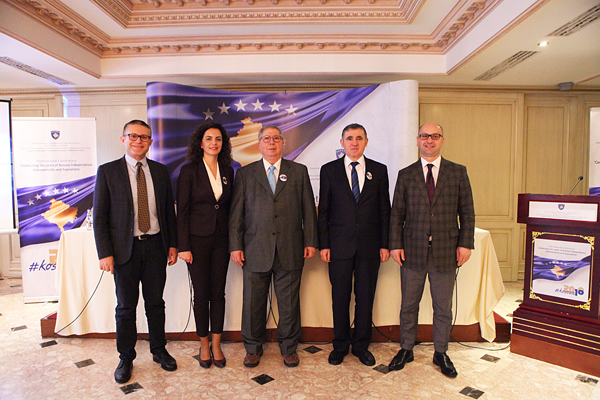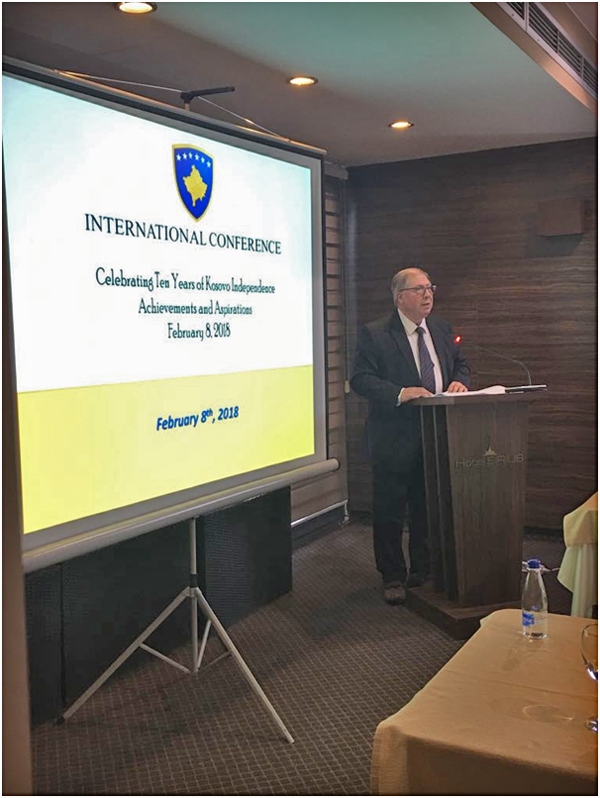Diplomatic Recognition, Defence Diplomacy , Nation Building and Civil Military Relationship
On February 8, 2018,to celebrate the 10th anniversary of Independence of the Republic of Kosovo, Professor Nabil Ayad , Assistant President of the Global Council for Tolerance and Peace and founder and former Director of the Academy of Diplomacy and International Governance, Loughborough University London organised the 22nd International Conference in the series of Diplomacy in the 21st Century in collaboration with the Kosovo Diplomatic Academy.
The conference was attended by senior government officials, decision - makers, diplomats , academics and practitioners.

(l-r)Dr Burim Ramadani, Deputy Minister of Kosovo Security Force, Republic of Kosovo; Mrs Rejhan Vuniqi, Deputy Foreign Minister of Foreign Affairs, Republic of Kosovo; Professor Dr Nabil Ayad, Conference Chairman - Assistant President, Council for Tolerance and Peace, founder and former Director, the Academy of Diplomacy and International Governance, Loughborough University London;
Ambassador Dr Beqir Ismaili, Director of Kosovo Diplomatic Academy, Ministry of Foreign Affairs; Mr Abuselami Shkodra, Deputy Minister of Interior Affairs, Republic of Kosovo

Professor Dr Nabil Ayad, Conference Chairman - Assistant President, Council for Tolerance and Peace, founder and former Director, the Academy of Diplomacy and International Governance, Loughborough University London
Presentations by His Excellency Behgjet Pacolli, First Deputy Prime Minister and Minister of Foreign Affairs of the Republic of Kosovo, and former President of the Republic of Kosovo
and Ambassador Ahmed Bin Mohamed Al Jarwan, President, Global Council for Tolerance and Peace, Malta
"Defence Diplomacy, Nation- Building and the Civil-Military Relationship - Tolerance and Peace as Pre-Requisites for Nation-Building" presented by Ambassador Ahmed Bin Mohamed Al Jarwan, President, Global Council for Tolerance and Peace, Malta (PDF) >>
"Challenges of Nation Building" presented by His Excellency Behgjet Pacolli, First Deputy Prime Minister and Minister of Foreign Affairs of the Republic of Kosovo, and former President of the Republic of Kosovo (PDF) >>
Programme
Kosovo Diplomatic Academy, Ministry for Foreign Affairs, Republic of Kosovo
Celebrating the 10th Anniversary of Independence: Achievements and Challenges
Defence Diplomacy
Diplomatic Recognition of Kosovo, Nation Building and the Civil-Military Relationship in a Mutating Environment
Pristina, Kosovo, 8th February, 2018
The aim of this international conference is to celebrate the anniversary of ten years of independence of Kosovo and to assess its achievements and aspirations.
Introduction
The aim of defence diplomacy is to protect the territorial integrity and advance the national interests of the host country by containing crises, resolving conflicts and arriving at durable, win/win outcomes. The purpose of this conference is to explore the ways in which defence diplomacy can best deliver on its mandate, and to examine both the progress to date and possible ways forward.
As 2018 begins, we are entering a mutating and quickly evolving era in diplomacy and international relations. Power is shifting, globalization is under strain, and world order is at risk. State leaders, through social media and especially Twitter, are quick to comment quickly on a variety of shifting and transforming situations. With the advent of the 24/7 news cycle, politicians, opinion leaders and citizens tend to concentrate on the ‘now’ and to be greatly influenced by the present moment. In the “post-truth” age, important factors such as the historical context, complex background information and theoretical or philosophical underpinnings have diminished in importance. In addition, with the revolution in information and communications technologies, we have been whisked from the Gutenberg Galaxy into cyber-space. The use of media itself is evolving, with smart phones, tablets and computers accelerating time, compressing space, and displacing our reliance upon more traditional sources.
What impact is this situation having on our thinking about defence diplomacy, nation building and the civil-military relationship?
Unfortunately, our performance has not kept pace with the rapidly changing times.
When greeting the diplomatic corps in Paris at the outset of the year 2018, French President M. Emmanuel Macron memorably stated:
| We must underline our collective responsibility, we who should know better than all of our predecessors what led humankind into the misery of the past and what could cause it to no longer exist in the future. We must never sleepwalk through the world which lies before us, we must always remain alert and set high standards.[1] |
Are we willing - or able - to “remain alert and set high standards”? The issues, considerations and decisions at hand are vexing and massive. Is it more effective to concentrate on policy/diplomacy which is based on aggression, attack or perceived military threats, or on diplomacy based on the pursuit of peace and protection of the homeland? How does diplomacy based on aggressive intent differ from diplomacy based on defense? How do foreign ministries and defence departments, diplomats and soldiers interact? Are these institutions fit for purpose given the daunting nature of the challenges they face?
Analysis: Nation Building and the Civil-Military Relationship
As a new nation, recognised by International Court of Justice in July 2010, Kosovo has confronted and is continuing to confront many obstacles to its prosperity, security and survival. The Kosovo government understands, values, and is committed to peace and living in harmony with those of various ethnic, religious, and cultural origins. Today, many nations in all parts of the world are diverse and multicultural, comprised of persons of various ethnic, religious, linguistic and cultural origins. Among and between these groups, tensions may exist regarding disparate levels of wealth, social inclusion and political influence, all of which tend to vary widely. A fundamental question must therefore be put: does nation building consist of the consolation of power on the part of the dominant group(s) in tandem with the rejection and exclusion of those who are different? Alternatively, does nation building consist of outreach, integration and the ultimate acceptance of those whose origins differ, or who may be arriving, or have earlier arrived from the outside? These are difficult issues and they do not give rise to easy decisions. But they are fundamental questions which all in positions of influence must confront.
They are perhaps best addressed with empathy, compassion and an open mind.
Among the many matters related intimately to the defence-diplomacy dialectic is the relationship between the civil the military administrations. In some cases, having traditionally enjoyed a paramount position in the national political economy and overall scheme of things, the military may be unwilling to relinquish its power. In other instances, civilian political leaders may endeavour to achieve a degree of popular control over the state’s instruments of violence, often after a protracted period of transition, and sometimes without the capacity necessary to ensure adequate national defence. The challenges that civil-military relations face in many developing countries involve problems of authority, legitimacy, institutional deficits and a lack of human and financial resources. Even in many long established Western countries, these sorts of challenges remain salient.
How then, can we better understand these complex and difficult issues, and what is to be done?
Key points for discussion
Diplomacy and defence are common terms, but they are often confused and misunderstood. How might they best be defined?
How are defence and diplomacy related? What do they have in common, and where do they differ?
Do soldiers and diplomats speak the same language? What are the obstacles to effective inter-institutional communication, and how might they be overcome?
Is security more than a martial art?
How can diplomacy and defence contribute to development?
Are we collectively sleepwalking towards disaster, as was the case in 1914?
What is the role of international organizations in enlarging the political space required for defence diplomacy?
What are some best practices and case studies in successful defence diplomacy?
How might the lessons learned best be summarized?
[1] Macron, P. E., 2018. France Diplomatie. [Online]
Available at: https://www.diplomatie.gouv.fr/en/the-ministry-and-its-network/events/2017/article/president-emmanuel-macron-new-year-greetings-to-the-diplomatic-corps-04-01-18
[Accessed 20 February 2018].


